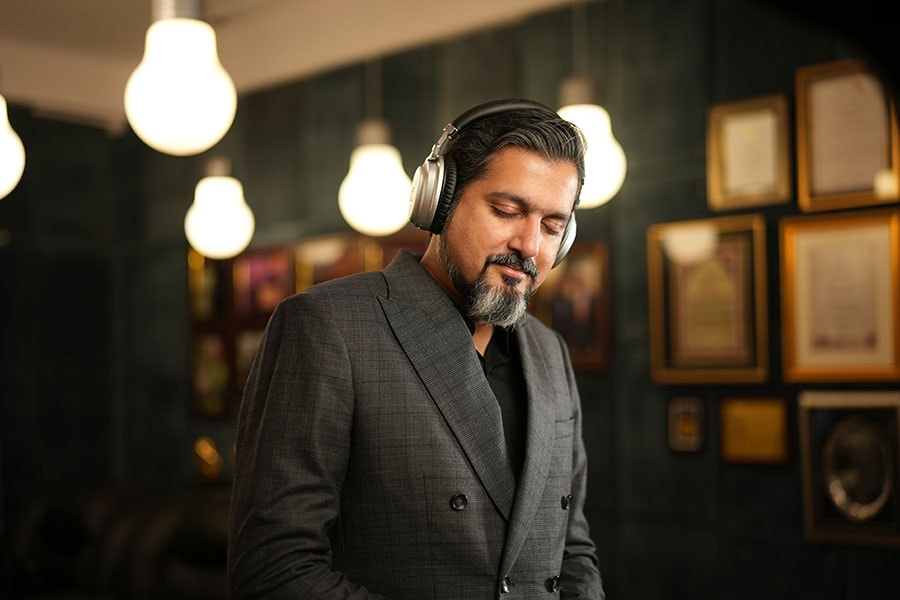The most important thing is to create music from the heart: Three-time Grammy winner Ricky Kej
The musician and environmentalist gives insights into his journey, creative process, inspirations, making music with a purpose, how big awards like the Grammys help in spreading the message, and his advice to young musicians
 Ricky Kej, musician and environmentalist.
Ricky Kej, musician and environmentalist.
With over 100 music awards across 20 countries, Kej also holds several notable roles, including United Nations Goodwill Ambassador, United Nations Refugee High Profile Supporter, UNESCO MGIEP Global Ambassador for Kindness, UNICEF Celebrity Supporter, and Earth Day Network Ambassador. His extensive body of work features 24 internationally released studio albums, more than 3,500 commercials, and eight feature films, including the acclaimed natural history documentary Wild Karnataka, narrated by Sir David Attenborough.
In a conversation with Forbes India, Kej talks about his recent album, collaboration with Vedam Records, his inspirations, and more. Edited excerpts:
Q. How did your collaboration with Vedam Records come about? How does this partnership align with your mission to create music that not only entertains but also inspires and educates?
I've been composing melodies for Break of Dawn for many years. I think the first melody that I composed for this album must have been in 2015. I had been composing these melodies, but not putting them down in a focussed manner and recording them. I had just been roughly recording them on my phone or putting down some notes on my computer. Various life experiences led to each of the songs on the album, and so, they're distributed over the last eight to nine years. This year I decided that I will wrap up this album, and that is where I met the folks at Vedam Records. Together, we discussed this label, which is more of a movement that they are starting through Vedam which is all about mental wellness, showcasing India to the rest of the world, and about holistic well-being. It was a step towards music with a purpose, and it was in complete alignment with whatever I wanted to do.
Being an environmentalist, I've believed that the imbalances of ecology and nature are a direct result of the imbalances of the mind. In order to purify nature, the ecosystems and ecology, you have to first purify the mind. I think our mental well-being and the well-being of our planet have a symbiotic relationship. That is why I thought that this album has to be fully focussed on mental wellness. Every song is based on a different raag, and the raags have been heavily researched by me. The way I created the arrangements, the instrumentation, and the frequencies for all of them are calming. Nothing stands out. Nothing is abrasive while listening. It just unclogs our brain.
Also read: We want I-pop to become a global phenomenon: Spotify India MD
Another beauty of Vedam is the amount of freedom that they offered me while creating the album, and that is why this album is truly a piece of me without any baggage. Working with Vedam helped me focus just on the music without bothering about other things like marketing, budgeting etc. When I delivered the music to them, there was no request for any kind of changes whatsoever. In fact, the opening track of the album is nine minutes long, which is unheard of for a musical album, and almost all the songs are over five minutes long. Normally, a record label will come back to you and say that, no, it has to be under three minutes. People's attention spans are coming down and all of that stuff. But they said, ‘You do your work. You make the best possible music, and it's our responsibility to disseminate it and make sure people listen to it.’ And that is why I think it is a beautiful collaboration.
Q. Can you walk me through your creative process?
Usually, a melody comes my mind, and it can happen at any point. Maybe when I'm in a forest, and I'm trying to interpret the sounds of nature through music, or when I'm walking on the street and I'm creating a rhythm. Then I record that melody and try to figure out what I am trying to convey through it. If there is a message that I want to put out, or if this melody has come through something that I want to talk about—something to do with nature or raising awareness on a particular issue with respect to climate change, or if it's about elephants or anything like that. It then sort of becomes a struggle to convey that emotion through the overall soundscape of the music that is the overall instrumentation, whether it's an orchestra or whether it is an Indian ensemble. It becomes about how to create that piece of music and flesh it out beautifully so that the end listener feels the emotion that I want to convey—whether that's going to be through the lyrics or just the instrumentation, whether I want it to be open to interpretation or I want a direct message to come out through it. The first step is just me working with computers and creating that music.
Also read: A R Rahman: A sound in the making
The next step is my favourite part… bringing musicians into the studio. Musicians can be of two kinds. One, basically the western classical musicians, like, let's say a symphony orchestra. If I work with a symphony orchestra, everything needs to be written out to them, and sheets need to be placed in front of every musician… the musicians play it, and it sounds beautiful. But if it's an Indian musician, that is where the fun happens. For instance, if I call in, let's say a bansuri player, I don't go too planned into a studio. What happens is that I give them a basic framework of what the melody is. And these people are absolute experts, especially the good Indian classical improvisation musicians… they will take my melody to another level. They'll take it into places which I never imagined, bringing their life experiences, their skill, their musical knowledge, all of that stuff. For me, it is just sitting down and seeing them do their magic. And I have a principle while working with musicians—I only work with musicians who are better musicians than me, because I want them to make me sound good. Then it becomes about putting the whole thing together through the technology of mixing and mastering it, and getting the right sounds, the right frequencies, making sure that people enjoy listening to it while I'm playing it back and all of that, and then releasing it. That is the process.
Q. How has wellness music been reinterpreted to connect with today's global audience?
Wellness music can be of various kinds. Because everybody has got a different idea of what unclogs their minds, and what calms them down. For me, sometimes, when I'm angry about something, or I'm anxious, I listen to heavy metal and that sometimes calms me down. And I know a lot of friends of mine who are metalheads who feel that heavy metal is sort of meditation for them. I would say that Indian music—a raag-based music—is the best and truest form when it comes to wellness music, because it is ancient, number one, and number two is that it's heavily researched. And it has worked for so many years. I believe that when nothing else works, Indian classical musical or raag-based music always works.
That is the whole point of Break of Dawn, and also the collaboration with Vedam—using Indian traditional music and showcasing that to the world as the best form of wellness.
Q. What inspires you to continue blending music with environment and activism? Are there any particular experiences or influences that have shaped your approach?
Ever since I remember as a child, I've been two things: A musician and an environmentalist. That has pretty much defined my whole life. Even before I knew what the meaning of the word environmentalist is, I was an environmentalist. I grew up for the first six years of my life in America, and after that, of course, the family moved to India… since I was six, I've been in India, in Bengaluru. While I was in America, we lived in the middle of nowhere in this really small town in North Carolina. And in this small town, we had a lot of wooded areas around our home, and so we would have a lot of visitors, creepy crawly animals like lizards, snakes, frogs, rats and insects. I was advised by my teachers and parents that as soon as you see these animals, step on them and kill them, or run away from them. My question to them used to be that if you are supposed to kill them the minute we see them, or if you're supposed to run away from them, or if they are just dangerous animals, why do they exist? They obviously have some sort of purpose. And, of course, now we all realise that every single species of animal, no matter how seemingly insignificant or how seemingly small, is a very important part of the ecosystem. And it's this ecological balance that keeps all of us alive. Those were the things that would keep me awake at night. I would be drawn to these animals. I would try to see personality in these animals. I used to think of them as being my brothers and sisters. Somewhere along my journey of being a musician, both these parts came together, where I realised that this is the kind of music that I need to create. The music needs to be with a purpose, and I do not want to create music that somebody else is asking me to make.
Also read: Lata Mangeshkar: Voice that united India
I realised that if I've got the gift of being a professional musician, I want to do the kind of music that I love doing. Otherwise, there's no point. I can be anything. If I'm doing music as a job, then I can be doing anything. I want to do music as a passion and a profession. My passion is the environment, and that is the reason why all of my music ended up being about the environment and positive social impact.
Q. What are your upcoming releases and collaborations?
I've got tonnes and tonnes of ideas that I want to execute, but the thing is that I've just released this album and I want to give it its light of day. Since it's a niche genre of music, it's important to find the audience that appreciates this music. I'm going to work really hard to get as many people to listen to this album as possible, simply because I would love people to listen to my music, but at the same time, I feel that people can truly benefit from this music.
Q. What legacy do you hope to leave through your music and collaborations? What impact do you want to have on the music industry and the world at large?
I think that at the end of the day if you purify the mind, you purify the environment and society. It is vague and an outrageously large ambition, but if I can be a small part of that through my music, then I think that would be the impact that I would like. Now, this kind of an impact cannot be quantified in general, but we will be able to see it in our everyday lives.
Q. What advice would you give to emerging artistes who want to use their music to make a difference in the world, particularly in the realms of sustainability and education?
The most important thing is to create music from the heart. If you're creating music on a social issue or a social topic that is not close to you, and you're just doing it as a job, or trying to create an advertising jingle or something like that, people see through that. People can smell an agenda. I feel that it has to be about something that you truly feel strongly about. It could be even about potholes, or sanitation around your home, or about garbage, or it could be about anything.
I think it's important that we stop looking at music as being something that is commissioned to you and something that you are paid to do. It's important to create music from the heart and then marketing starts after that. If we take someone like Vincent van Gogh, one of the most celebrated contemporary artists of the world, as an example, if he was making a new painting, I cannot imagine him going to all the neighbouring art galleries to see what everybody is doing, or checking which colors are in vogue right now. He would just dig deep into his heart, and he would create a piece of art that truly defines him at that moment in time. And if I wanted to know what kind of a person Vincent van Gogh was, I'm not going to read a book about him. I'm just going to look at all of his art, and I'm going to judge what kind of a person he is. But today, most musicians are making either love songs or item songs. How do you judge what a musician is truly thinking by listening to that music? I think even if other people are writing music for the singers, they need to select songs which are truly reflective of their own personality. What we need to do is to create music, even if it is across genres, about topics that we feel strongly about. That is what I would advise to emerging musicians. Think about what you want to tell the world and make music about that.
Q. What was the experience of winning the Grammys?
Awards can always be taken in two ways. One is vanity. The second way is the way that I take it, that it's a platform. I care about awards. I think awards are amazing. But the thing is that I do not care about awards before I make the music. For me, it is about creating the music, doing it in the best possible way, pushing it out to the world with as much heart and soul as possible, and then if it wins an award, I'm very, very appreciative of the award. What the award gives me is a platform for doing bigger and better things, for collaborating with the artists that I've always wanted to collaborate with, for opening doors that I could never open before. Since my music always comes with a message, it helps spread that message further and wider. I believe that with my first Grammy in 2015 I was given that platform. Prior to winning the Grammy, with my environmental message, some people would take me seriously, some people would not. But once I won the Grammy, a few more people started taking me seriously, and it was easier for me to talk to people. It was easier for me to do my advocacy when it comes to environment and social impact in a much bigger way. And the same thing with the second and third Grammy. The feeling of getting those awards is obviously quite exhilarating. It's amazing because it also gives you a lot of validation for what you're doing, especially since I've taken a path that very few people have taken when it comes to music. It also gives you a pat on the back to continue doing what you're doing, you don't have to succumb to pressures. It's good to win those awards, and I do not take them for granted at all.


















